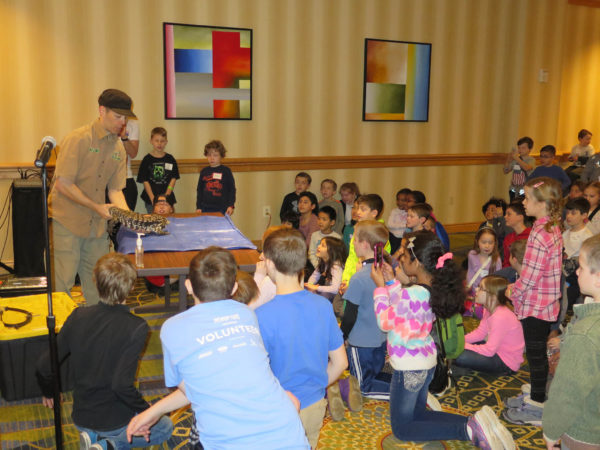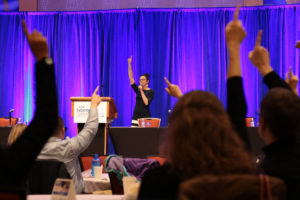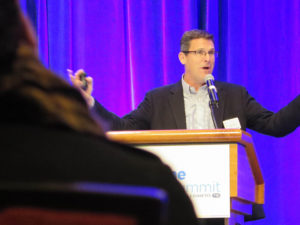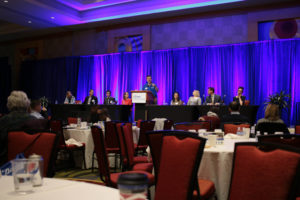
“Making a difference” – as a T1D patient, supportive family member, physician/scientist, or legislative advocate –served as a key theme for the 2017 TypeOneNation Summit held on Saturday, March 11 at the Bethesda North Marriott Conference Center. The event, which drew a capacity crowd of nearly 1,000, included a youth and teen program, and breakout sessions to discuss navigating T1D with toddlers, at school, during the teenage years, and in adulthood.
Summit moderator Rachel Mayo kicked off the program by reminding the attendees that “there is so much hope in the people in this community.” Mayo, who is a writer, public speaker, and T1D advocate, noted that even though living with the disease is hard, “you can choose to be in control.”
JDRF’s Chief Mission Officer Dr. Aaron Kowalski, PhD, provided those gathered with an overview of significant Breakthrough T1D-funded research advances. “We’re doing the greatest good for the largest number of people, as quickly as possible,” he said. “The number one metric for success is the people at the end of the development pipeline – what is going to drive your diabetes health to a better place, and simultaneously make your life easier?”
Those advances include the world’s first artificial pancreas system that will adjust insulin every five minutes, leading to much tighter, smoother control. On the horizon: miniaturization and a single point of insertion.
The broad portfolio of Breakthrough T1D funding includes research into diabetes complications to help prevent kidney and eye disease, research to predict who is at the highest risk of getting T1D, and beta cell replacement therapies designed to help individuals with T1D produce insulin again.
Dr. Juan Dominguez-Bendala, Director of Stem Cell Development for Translational Research at the Diabetes Research Institute (DRI), expanded on Dr. Kowalski’s comments and spoke extensively on the promise of Breakthrough T1D-funded beta cell replacement therapies at DRI, like the BioHub, aimed at providing insulin independence without systemic immunosuppression.
Breakthrough T1D Senior Vice President for Advocacy and Policy Cynthia Rice provided an advocacy update, and reminded the audience that it’s through their personal advocacy that Breakthrough T1D’s patient voice and scientific credibility can influence and accelerate life-changing policies. A major victory just this year: the federal government clearing the way for reimbursement of continuous glucose monitors in the Medicare program. Of additional critical importance is the upcoming renewal of the Special Diabetes Program by Congress, which provides $150 million annually for diabetes research. Rice and her team are also working with scientific leaders and regulatory agencies to promote innovation and gain rapid approval of new therapies to treat T1D.
In the afternoon, a panel of psychologists – Melissa Hendricks, PhD, from the Kennedy Krieger Institute, Maureen Monaghan, PhD, CDE, from Children’s National Health System, and Jessica Parrish, PhD, from Pediatric Specialists of Virginia discussed the role of psychology in living with diabetes. Treatment programs now often include a psychologist as part of the team, and issues treated include difficulties with self-management, parent-child conflict, depression, and anxiety. Hendricks, who lives with T1D, noted that it’s tough but manageable. “It’s about finding that balance and learning to navigate your daily life through the help of psychology, and learning new skills to balance health and happiness. No one can be perfect with blood sugars numbers.”
Brian Herrick wrapped up the day with an entertaining and humorous talk about his participation in the University of Virginia’s Artificial Pancreas clinical trial program. He shared his experiences of living with T1D for 25 years, and brought new hope to those in attendance when he described having his overnight blood sugars level at 105 during the trial.
Breakthrough T1D Greater Chesapeake and Potomac Executive Director Bill Parsons closed the Summit by encouraging attendees to keep up the good fight towards a cure for T1D. “Together, we really WILL turn Type One into Type None.”
We look forward to seeing you at the 2018 TypeOneNation Summit! For video of the 2017 Summit, please click here.


